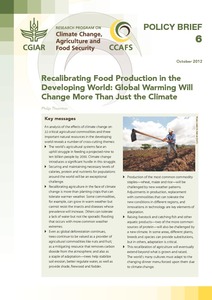Resource information
An analysis of the effects of climate change on 22 critical agricultural commodities and three important natural resources in the developing world reveals a number of cross-cutting themes: The world’s agricultural systems face an uphill struggle in feeding a projected nine to ten billion people by 2050. Climate change introduces a significant hurdle in this struggle.
- Securing and maintaining necessary levels of calories, protein and nutrients for populations around the world will be an exceptional challenge.
- Recalibrating agriculture in the face of climate change is more than planting crops that can tolerate warmer weather. Some commodities, for example, can grow in warm weather but cannot resist the insects and diseases whose prevalence will increase. Others can tolerate
a lack of water but not the sporadic flooding that occurs with more common weather extremes.
- Even as global deforestation continues, trees continue to be valued as a provider of agricultural commodities like nuts and fruit; as a mitigating resource that removes carbon dioxide from the atmosphere; and also as a staple of adaptation—trees help stabilize soil erosion, better regulate water, as well as provide shade, firewood and fodder.
- Production of the most common commodity staples—wheat, maize and rice—will be challenged by new weather patterns. Adjustments in production, replacement with commodities that can tolerate the new conditions in different regions, and innovations in technology are key elements of adaptation.
- Raising livestock and catching fish and other aquatic products—two of the more common sources of protein—will also be challenged by a new climate. In some areas, different plants, breeds and species can provide substitutions, but in others, adaptation is critical.
- This recalibration of agriculture will eventually extend beyond what is grown and raised. The world’s many cultures must adapt to the changing dinner menu forced upon them due to climate change.


